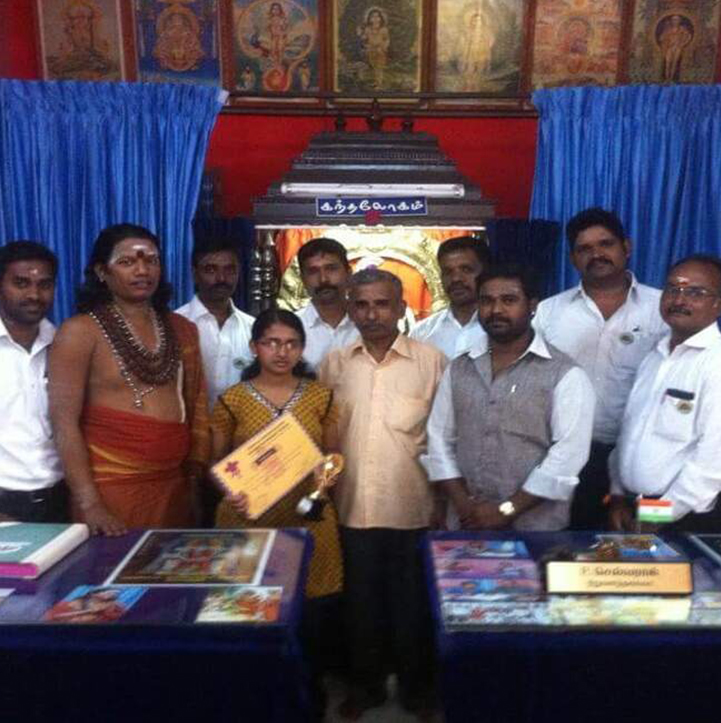


| Organization’s Name | Kandhalogam Siva Subramaniar Trust (KST) | |
|---|---|---|
| Legal Status | Registered to the Ministry of Social Welfare of Tamilnadu. Reg. No. 224/2012 | |
| Address | 253,54, Ashoka Complex, Karuppagounder Street, Coimbatore–641001 | |
| Year of establishment | 2012 | |
| Contact Person and Contact Information | Mr. P.Selvaraj Founder cum Managing Trustee, Kandhalogam Siva Subramaniar Trust 253,54, Ashoka Complex, Karuppagounder Street, Coimbatore–641001. E-mail: kandhalogam@gmail.com, Mobile: +91 97513 15646, 8300287553 |
|
| Bank account information | PAN No | AACTK3180B |
| Bank | ICICI | |
| CIF ID | 574736170 | |
| IFSC | ICIC0000342 | |
| BSR CODE | 6390005 | |
| MICR CODE | 641229006 | |
| SWIFT CODE | ICICINBBCTS | |
| AD CODE | 6390536-9200009 | |
| GSTIN | 33AAACI1195H1ZT | |
| Bank | Axis Bank | |
| Account no | 918010030028718 | |
| CIF ID | 880917529 | |
| IFSC | UTIB0001919 | |
| BSR CODE | 6360081 | |
| MICR CODE | 641211013 | |
| SWIFT CODE | AXISINBB563 | |
| AD CODE | 63600819200008 | |
| GSTIN | 33AAACU2414K1ZM | |
| Program Name | Kandhalogam Siva Subramaniar Trust | |
| Project Title | ORGANIC FARMING TO IMPROVE FOOD, NUTRITION AND INCOME SECURITY FOR RURAL POOR FARMERS IN ATHTHIKADAVU AND THE NEIGHBORING VILLAGES, COIMBATORE DISTRICT, TAMILNADU, INDIA | |
| Project Area | Coimbatore District, Tamilnadu, India | |
| Project Duration | 12 Months | |
Kandhalogam Siva Subramaniar Trust is a Non-Governmental, Secular, NonProfit, organization registered as a Trust under Indian Trust Act. It was founded in the year 2012 by Mr.P.Selvaraj at Coimbatore. The Trust is one of the leading organization in the whole of South Tamilnadu, India working primarily to promote Education, Health & Self Employment. The Trust offers to promote Education, Health & Self Employment through holistic method that is affordable and accessible to all.
ORGANIC FARMING TO IMPROVE FOOD, NUTRITION AND INCOME SECURITY FOR RURAL POOR FARMERS IN ATHTHIKADAVU AND THE NEIGHBORING VILLAGES, COIMBATORE DISTRICT, TAMILNADU, INDIA
The concept of food and nutritional security refers to the ability of all people at all times to have physical and income access to sufficient, safe and nutritious food to meet their dietary needs for an active healthy life.
It requires food be available, enough, stable and accessible without which inevitably leads to malnourishment that hinders individual performance. Food and nutrition insecurity is as a result of farmer’s lack of knowledge on effective agricultural techniques and ability to meet costs of necessary seeds and equipments because of their limited income among other reasons.
The effects exhibit themselves in hunger which is the extreme expression of poverty, due to small scale farmers’ inability to produce enough food for their own consumption and to sustain their communities.
For that reason, any enhancement of the food security calls for farmers’ sensitization and encouragement to adopt strategic methods that will not only cater for food and nutritional security but also income at household level and sound management of the environment.
The organization’s commitment to making TamilNadu a role model in embracing sustainable farming practices in order to improve livelihoods and alleviate poverty serves 5 as the motivation to initiating participatory practices in promoting sustainable development initiatives among the resource poor rural community members.
Therefore, KST takes up the challenge of generating awareness on the dangers of conventional agriculture, training on organic farming as an alternative method and follow ups to ensure proper implementation and sharing information for sustainability.
The target beneficiaries are the small scale holders who are most affected by the prohibitive cost of agricultural production and the escalating land degradation through contamination by toxic inputs and loss of fertility through erosion. The project therefore is aimed at enhancing food security and farmer’s participation in environmental conservation for sustainable production during our lifetime and for the future generations.
Since the introduction of the scientific agriculture, farmers and consumers have lacked awareness and information on the dangers posed by chemical substances on the conventionally grown products to the growers, consumers and the environment. The conventional agriculture has provided for the usage of toxic materials in crop protection without putting into account the other problems they will generate and their effects.
The soil fertility has been affected most given that in this form of farming, soil is no longer regarded as a living system constituent which should be kept free of pollution by poisonous chemical agents and consequently reducing its productive quality over time thus poor yields and eventually subjecting households to food insecurity.
Human health has been put in danger in at least two major ways; the handlers of the synthetic farm chemicals do not comply with the worker safety rules when in operation and on the other hand residues of chemicals sprayed on crops ends up being ingested by the consumers of these foods. This therefore has been responsible for adverse health effects such as disruption of the hormone, nervous and immune systems.
Conventional agriculture does not consider its impact on the environment either. So much pollution has resulted from environmentally careless practices such as chemical depositing causing decimation of insects and other organisms’ populace, fertility decline, water, air and soil pollution. Mechanization has encouraged tree felling and loss of ground cover. This facilitates erosion and later desertification while monoculture which is best associated with mechanization, has brought about the loss of indigenous food stuffs and seed banks hence denial of communities’ nutritional security.
Over dependence on external inputs has made small scale farmers fall deeper into debts and progressive poverty levels because majority cannot cope with the ever rising prices of the farm inputs.
Therefore, KST endeavors to address and change this situation by invoking communities’ consciousness and sensitivity of their responsibility towards themselves, the ecosystem and the future generations.
Organic farming is a system of agriculture that uses environmentally sound techniques for raising crops and livestock that are free from synthetic compound. The methods used in organic farming seeks to increase long term soil fertility, balance insect and organism populations and reduce air, soil and water pollution while maintaining or increasing levels of production.
As opposed to the conventional farming system, organic farming keeps the welfare of every player in mind including the provision for fairness in farm situation and in trade. It stimulates the societal and individual responsibility for the environment hence sustainability.
KST therefore, envisions attainment of improved livelihoods, free from poverty, environmentally conscious and assured in sustainability. It is committed to promote organic farming in pursuance of its obligation sustainable development initiatives amongst small scale rural farmers as a means of empowering the communities towards better living.
However, KST faces a human and financial capacity limitation and upon finding a financial partner, it will be in a better position in achieving its long term goals and the same time help members of the community who really need better farming methods.
This project aims at training 1, 500 farmers every year having raised the figure from previous figure of 800 farmers, and directly benefiting about 5,000 members of their households. The farmers are then followed up to assist in adoption of the ideas and their implementation.
Food security improves as a result of improved and maintained soil fertility. Diversification of crops leads to improved nutritional status of the communities. Food production expectation is a rise by 35%.
Advocacy in environmental conservation and agro forestry will go a long way into reclamation of the lost forest cover. This ensures sustainable ways of acquiring wood products without exerting pressure on the natural forests. The general environmental conditions will largely change for the better.
Increased nutrition and food production will pave way for sale of surplus and therefore increasing the household income levels hence reduced poverty.
Organic farming methods are less costly and utilize locally available materials thereby reducing overdependence on expensive inputs. This translates that the farmer’s affordability of required inputs will be increased.
In order to examine the efficacy of the organization towards achieving the goals and objectives, some important pointers are used. They are based on the set targets for the time frame and their extent of changing the conditions of the beneficiaries’ lives for better.
They include the number of awareness meetings conducted, number of farmers trained, rate of adoption leading to decreased dependence on external and detrimental inputs as well as the conspicuous change of attitude by the farmers and their neighbours manifested in regular exchange visits and replication of the techniques.
Increased production per unit area as a result of improved soil fertility ensures there is more produce for food and the surplus is offered for sale thus raising the income for households.
Lasting effects as a result of the project includes better living standards and reduced poverty levels among the community members. This will be brought about by the raised income levels and improved health conditions in extension of more and healthy food availability and reduced subjection hazardous practices and inputs.
Sustainability environmental sanitation will be experienced as a result of reduced deforestation increased a forestation and agro forestry practices. Adversities in climatic change such as desertification and effects of global warming will be mitigated.
The knowledge and information imparted to the community is one that will be used to encourage them utilize resources in an inexhaustible way. This will let communities exploit resources during their lifetime and handover to the future generations in first rate order. These skills will therefore make generations regard themselves as custodians of nature given resources and not consumers.
The system used during knowledge transfer involves institutionalization where trained individual farmers are organized into groups and encouraged to manage their own operations. They establish formal leadership in their respective groups which is directly responsible for group’s running and linkages with other developmental networks and for information sharing.
The groups’ members are subjected to all the skills relevant to all their undertakings to ensure building the communities’ human capital. This will guarantee continuity and at the same time induce intra community knowledge.
Different groups carry out needs assessment and start income generating projects. This is an incentive to hold together and champion other communal activities and needs. Income generating activities increases individual’s per capita and is in line with poverty reduction strategy thereby committing members to uphold the projects. The proceeds help in sustaining the intended ecologically sound projects.
The risks that surround the development of these undertakings includes:-
Reversion: Some of the trained farmers may revert back to their old ways of farming i.e. conventional farming.
Weather Conditions: Large number of our target group relies on rainfall for their agricultural activities which has of late been characterized by erratic situations thus interfering with on farm implementations.
Commercial Interference: Some merchants promoting their synthetic products and or transgenic seeds may influence the farmers’ perception. This in most cases will occur to individual farmers on the lookout or in need of making quick gains.
Group’s Disintegration: Sensitized and trained community members might be unable to hold together onto their convenient groupings making it difficult for follow ups and sharing of ideas
Assumptions related to the project includes:-
Strategies
Below are the major activities involved and include:
1. Awareness Creation
The community needs to be sensitized on the dangers associated with conventional farming and the availability of a convenient farming alternative. To achieve this, the deployed field team use different methods. These includes public rallies, field days, church gatherings, posters, visits to existing farmers’ groups and impromptu farm visits to establish contacts and enhance outreach. During this stage, importance, advantages and benefits of project and the KSTs modus operandi are highlighted and discussed in details. Interested farmers are assisted to form manageable common interest groups (CIG) and the training modalities and community action plans are set
2. Training of farmers
The method used in training involves introductory lessons on organic farming and other sustainable ideas carried out indoors. After this familiarization with the concepts, the trainees are subjected to demonstrations to aid in acquiring of relevant practical skills and finally participatory action based on-farm training. Discussions and sharing of ideas and experiences is highly encouraged at this stage and upholding is equally emphasized. Thematic approach based on soil conversation, long term soil fertility building, ecological farm management practices and energy saving are stressed.
Course Contents includes:
3. Follow Ups & extension
Trained farmers are offered post training services geared towards smooth transition to sustainable practices. These include continuous and regular visits by the field based staff in order to guide, advice direct and motivate them. Planning for real at this stage emerge given that the community members come up with various strategic livelihood improvement projects. The agents usually discuss their priorities with them and then link them with relevant business party.
4. Exchange Visits
This is an important activity aimed at facilitating farmers learning from their successive counterparts, discuss and share experiences and gain motivation. Respective trained groups and other interested individuals are assisted in organizing trips to visit other areas and witness for themselves that what they learn is practicable. This enhances farmer’s interaction and promotes farmer to farmer learning.
5. Information Sharing and Networking
KST works very closely with other likeminded organizations in order to improve on service delivery. This aids in complementing one another’s work, learning from each other and avoid collision or duplication of services. This also helps keep away from confusing the community and wasting time and resources. This therefore has called for formation of corporate networks which are vital in strengthening organization’s uniformity, ability and quality of information and services provided to the beneficiaries.
In this respect KST attends relevant meetings and workshops to gather knowledge, information and deliberate on important aspects of the sector. Joint collaborative activities such as policy formulation and development, advocacy and public awareness on topical issues across the networks are also taken part in.
Experiences, ideas and information are shared during these gatherings. They are later analyzed and processed to a level that suits the organization and then disseminated to the deserving grassroots recipients. Print materials received from other stakeholders are distributed to the farmers and interested individuals.
6. Monitoring
Scrutiny on the development of the project is continuous. The work by the field personnel is assessed on quarterly basis where they are supposed to report in writing progressively to the management, and discuss the progress in the staff business meetings held four times per year. The management on the other hand keeps records and presents them for auditing. Compiles progress and general reports, keep them safely and sends to the relevant partners. These reports are used for the evaluations.
7. Evaluation and Reporting
The organization’s progress is monitored and reported by the respective personnel submitting reports on how well their respective objectives have been met to the management. The management compiles them for documentation and further reporting to the board and funding agencies. The management is responsible for preparing and presenting the financial records to an auditor. The auditor inspects and prepares the audited financial reports which are later sent to the fiscal sponsors.
Evaluations are conducted yearly first by inwardly examining the extent of meeting the set objectives, what factors helped or prevented maximum output. During this, farmers from different areas are visited to provoke discussions. Our partners, depending on their choice, or a consultant appointed by them visit us and some parts of our coverage to get firsthand observation of the work we carry out with the support we get from them. This is usually done at their own convenience.
Besides, external evaluation is conducted by an independent consultant. The consultant writes a report and recommendations which are used for developmental adjustments and more importantly to help the donor assess the organization’s extent of use of the grant in meeting the community’s needs.
| ITEM | QUANTITY | PRICE PER UNIT | TOTAL |
|---|---|---|---|
| Seeds & planting materials during training | |||
| Dustless chalks | |||
| Felt pens | |||
| Masking tapes | |||
| Dust coats |
| EXPENSES | MONTHLY | ANNUAL TOTAL |
|---|---|---|
| Printing and photocopy | ||
| E. Mail and information outsourcing and telephone services. | ||
| Postage |
| PERSONNEL | NUMBER | MONTHLY ALLOWANCE | ANNUAL TOTAL |
|---|---|---|---|
| Director | |||
| Field Supervisor | |||
| Field Trainers and Clerk | |||
| Auditors Fee | |||
| Evaluation Fee |
| EVENT | TIMES | NUMBER | COST PER ATTENDANT | TOTAL |
|---|---|---|---|---|
| Staff business meeting | ||||
| Board meetings | ||||
| Local traveling during follow ups, awareness creation and training | ||||
| Farmers’ Exchange Visits |
